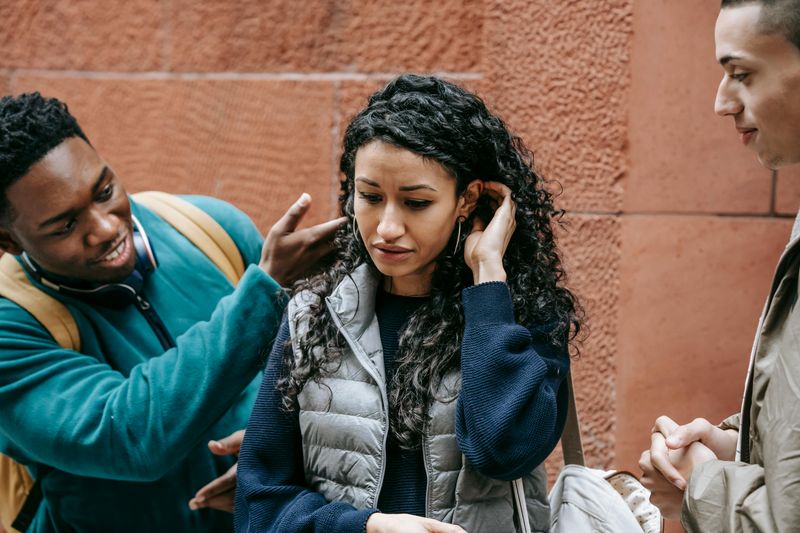15 Personality Traits That Make Friendship Harder Than It Should Be

Making friends seems simple, but certain personality traits can turn this natural process into an uphill battle. These characteristics might create invisible walls between us and potential friends, making connections feel forced or uncomfortable. Understanding these friendship roadblocks helps us recognize patterns in ourselves or others that might be getting in the way of meaningful relationships.
1. Constantly Expecting The Worst

People with high neuroticism spend excessive energy worrying about what could go wrong in friendships. They might obsess over a friend not texting back immediately, assuming they’ve done something wrong.
This constant anxiety creates a tense atmosphere where relaxed connection becomes nearly impossible. Friends may feel like they’re walking on eggshells.
The emotional rollercoaster of high neuroticism drains both parties. Simple misunderstandings transform into relationship crises, and the neurotic person’s friends eventually become exhausted from providing constant reassurance that everything is okay.
2. The Friendship Scorekeeper

Low agreeableness manifests as a tendency to keep mental tallies in friendships. These individuals remember every favor, slight, or imbalance, creating relationships that feel more like business transactions than genuine connections.
They’re quick to disagree and slow to compromise. Their critical nature makes casual hangouts feel like debates where someone must win and someone must lose.
Friends eventually grow tired of negotiating every decision or feeling judged for their opinions. The constant friction wears down even the most patient people, leading to friendships that fizzle out when others seek more harmonious connections.
3. The Social Battery That’s Always Dead

Those with low extraversion often feel physically drained after social interactions that energize others. They might cancel plans last minute because the thought of socializing feels overwhelming, leaving friends feeling rejected.
Group settings particularly tax their energy reserves. While extroverted friends are just warming up at parties, the introverted person is already calculating their escape plan.
This mismatch in social stamina creates friction. Friends may misinterpret their need for alone time as disinterest or rejection. The introverted person struggles to explain that their withdrawal isn’t personal—it’s simply how their social battery works.
4. Stuck In A Comfort Rut

When openness is low, comfort zones take priority—meaning familiar places get picked over adventurous dining options.
This resistance creates friction when friendship groups want to explore. While others eagerly plan hiking trips or cooking classes, the low-openness friend invents reasons why the new activity won’t work.
Over time, friends may stop extending invitations to novel experiences. The relationship stagnates as opportunities for shared discovery disappear. Friends eventually seek companions who share their curiosity about life, leaving the comfort-seeker behind in their well-worn routine.
5. The Emotional Fortress

A reluctance to show vulnerability means many friendships never break past casual talk, with serious topics quickly brushed aside.
They’ll listen to friends’ problems but rarely share their own struggles. This one-way emotional street creates an imbalance where friends feel they’re giving more than they receive.
The vulnerability-avoidant person misses opportunities for deeper connection. While they believe they’re protecting themselves from judgment or rejection, they’re actually preventing the very intimacy that makes friendship worthwhile. Friends eventually stop trying to scale their emotional walls.
6. The Conversation Hijacker

For some, every story is a stepping stone to their own. When friends share victories, self-centered talkers can’t help but pivot the attention back to themselves.
They dominate conversations without realizing it. Questions they ask serve mainly as springboards to talk more about themselves rather than genuine curiosity about others.
Friends eventually feel invisible and unheard. The emotional labor of interacting with someone who rarely shows interest in others becomes exhausting. People begin avoiding the conversation hijacker, preferring friends who practice the give-and-take that healthy communication requires.
7. The Friendship Perfectionist

Overly critical people notice flaws before strengths. They might point out a friend’s grammar mistake instead of appreciating the story they’re telling, or critique restaurant choice rather than enjoying the company.
Their standards extend to friendships themselves. They mentally grade interactions and find most wanting, creating an atmosphere where others feel they can’t measure up.
Friends begin censoring themselves to avoid criticism. Spontaneity and authenticity disappear as others carefully monitor what they say and do. Eventually, people seek less judgmental friends who celebrate their quirks rather than cataloging their imperfections.
8. The Lone Wolf

Those who deeply value solitude often struggle with friendship’s demands. They genuinely enjoy being alone and may go days without feeling the need for social contact, confusing friends who interpret silence as rejection.
Their independence means they solve problems without reaching out. While self-sufficient, they miss opportunities to build connection through mutual support.
Friends may feel unnecessary or taken for granted. The highly independent person doesn’t intend to push others away, but their contentment with solitude means they don’t nurture friendships with the regular contact most relationships require. Their friends eventually stop reaching out, assuming their efforts are unwanted.
9. The All-or-Nothing Friend

When depth is the goal, casual talk can feel empty. People who prefer meaningful connections look for discussions about life’s big questions rather than everyday small talk.
This intensity can overwhelm potential friends. Not every interaction needs to probe life’s mysteries, but the depth-seeker grows restless with small talk and may show visible disinterest.
Their impatience with relationship-building stages means many connections never develop. While seeking meaningful bonds is admirable, their rejection of casual camaraderie means they miss the gradual trust-building that typically precedes deeper connection. Friends eventually seek more balanced relationships with room for both depth and lightness.
10. The Approval Addict

Social inhibition creates a friendship experience dominated by fear of judgment. These individuals overthink every text message and replay conversations looking for mistakes, making friendship exhausting rather than enjoyable.
They often decline invitations to larger gatherings where social missteps feel more likely. When they do attend, they might hover at the edges, afraid to fully engage.
Their hesitation to express opinions or preferences makes them seem mysterious at first but eventually frustrating. Friends tire of someone who won’t choose a restaurant or share their genuine thoughts. The inhibited person’s fear of negative evaluation ironically creates the very rejection they were trying to avoid.
11. The Joy-Resistant Friend

The joy most find in friendships can be elusive for those with social anhedonia. They may appreciate the concept but seldom experience the emotional satisfaction of social connection.
They go through friendship motions without enthusiasm. Coffee dates, phone calls, and group activities that energize others feel like obligations they’re enduring rather than enjoying.
Friends sense this emotional disconnect despite the person’s best efforts. The anhedonic person’s reduced capacity for social pleasure means they initiate contact less frequently and respond with less warmth, eventually causing friends to drift toward more reciprocal relationships where their emotional investment is returned.
12. The Emotional Island

A natural distance often defines those with schizoid traits. They tend to shy away from close relationships, finding more comfort in their inner world than in social interactions.
They appear cold or detached without intending to. Their restricted emotional range means they rarely show excitement, disappointment, or other feelings that typically cement social bonds.
Friendship feels like an anthropological experiment rather than a natural human connection. While they might intellectually understand friendship’s mechanics, they struggle with its emotional components. Friends eventually stop trying to connect with someone who seems fundamentally uninterested in emotional intimacy, even if the schizoid person values the relationship in their own way.
13. The Friendship Escape Artist

Wanting closeness but running from it is a common paradox for those with avoidant personality traits. Their hypersensitivity to rejection makes even neutral remarks feel like criticism.
They sabotage budding friendships when intimacy increases. Just as a connection deepens, they find reasons to pull away, protecting themselves from anticipated hurt.
Friends become confused by their hot-and-cold behavior. The avoidant person’s intense fear of inadequacy means they prefer loneliness to possible rejection. Their protective withdrawal becomes a self-fulfilling prophecy as potential friends give up trying to navigate their contradictory signals.
14. The Human Hermit

Lacking interest in relationships, some individuals don’t experience loneliness the way others do. Months can pass without meaningful contact, yet they remain content.
They struggle to understand why others place such importance on friendship. Social norms like birthday celebrations, regular check-ins, or reciprocal support feel like arbitrary rules rather than natural human behaviors.
Their indifference to social connection means they rarely initiate contact or respond enthusiastically when others reach out. Potential friends eventually stop trying, assuming disinterest. The asocial person may occasionally wonder why relationships don’t last but rarely feels motivated to change their solitary patterns.
15. The Negative Energy Vortex

Type D personalities combine negative emotions with social inhibition, creating a challenging friendship dynamic. These individuals see problems everywhere and struggle to express their feelings constructively.
Their persistent negativity drains those around them. While everyone experiences bad days, the Type D person seems stuck in permanent pessimism, making interactions feel heavy.
Friends initially offer support but eventually grow emotionally exhausted. The combination of negative outlook and difficulty discussing feelings creates a one-sided relationship where others give emotional energy without receiving it. Friends ultimately distance themselves for their own well-being, seeking relationships that feel more balanced and life-affirming.

Comments
Loading…